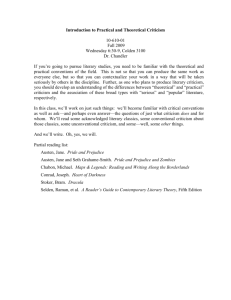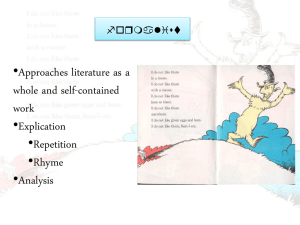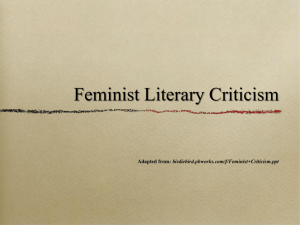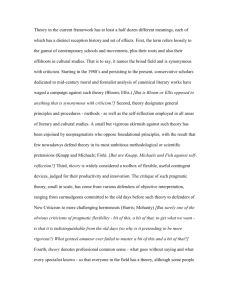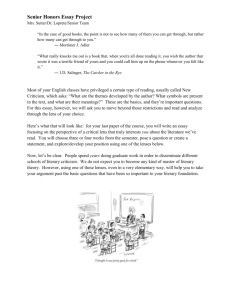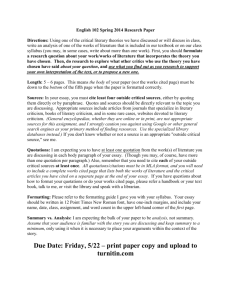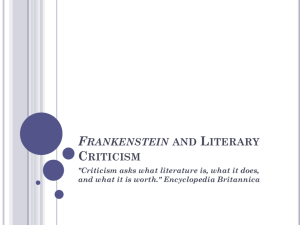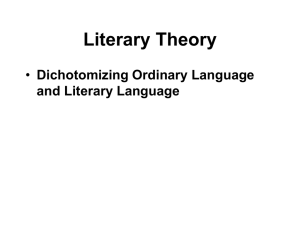Reader Response
advertisement
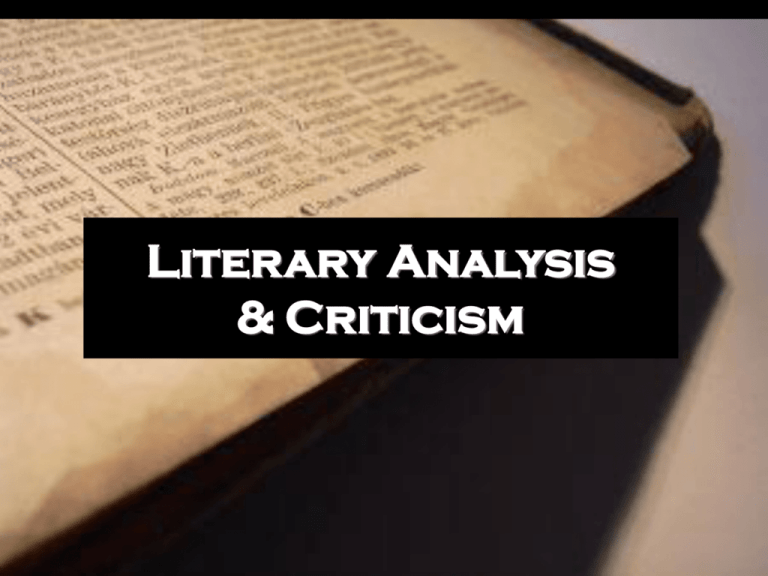
Literary Analysis & Criticism A text begins with an author I know the meaning... The author creates the text with ideas, personality, experiences, literary identity, a message, etc... The author leaves the TEXT for readers to explore The TEXT provides: a Stimulus a Blueprint Language Cues/Clues Critical input the Author’s ideas The READER encounters the text What does Readers bring their... • • • • • • • • Personality Language Culture Values Family structure Experiences Education Gender to the text. this mean? Clearly, this means the economic system is collapsing! The meaning is that the poor can overcome oppression! Readers in general have the same question: What does this [poem, story, novel] mean? Meaning Meaning = Text + Reader Wait! How can any interpretation be correct? What if the reader has the wrong meaning? Reader-Response Criticism Text<-------------------------------Meaning<------------------------Reader Meaning can only exist when the reader and text interact. The text alone does not have meaning. Each reader constructs his/her own meaning for a text. All interpretations are valid as long as the reader can provide textual evidence for support. However, a few RULES apply... RULES of Reader Response Criticism Rule #1: Do not ADD anything to the text. Rule #2: Do not IGNORE parts of the text. Rule #3: Do not CHANGE parts of the text. As long as readers do not manipulate the text to “fit” a contrived interpretation, and as long as readers can provide textual evidence, then any interpretation can be “valid” or “correct.” Rule #1: Do not ADD anything to the text. Let’s say that you like happy endings. You want each story to end harmoniously, and you feel that one can find the positive in any situation. If you interpret the ending of “Cinderella” as a statement about how gay marriage should be tolerated, since everyone cannot marry a prince, and the wicked stepsisters should become lesbians, are you breaking one of the reader response rules? or is your interpretation valid? YES... you are breaking one of the reader response rules. NO... your interpretation is not valid. Nothing in the text points to gay marriage, lesbians, or societal tolerance of homosexuality. Regardless of how much you want to see To say that the prince’s rejection is the catalyst for the cannot ADD WHAT IS NOT THERE the wicked stepsisters as lesbians, you stepsisters’ exploration of lesbianism and ultimately gay marriage to the text in order to fit what you is You also cannot support a farfetched thesis statement by adding your own ideas to the story. You must use only what ADDING to the text. want to see. is in the text. Rule #2: Do not IGNORE parts of the text. Using the same “Cinderella” example, suppose you say: #1: The ending of “Cinderella” clearly demonstrates how beauty, rather than intelligence or wealth, is the most valued asset in romantic relationships. -OR- #2: “The ending of “Cinderella” shows how a woman can manipulate a man into marriage through the façade of beauty and wealth.” Would either one be a valid interpretation? #1: This interpretation shows promise, as Cinderella has little more than her appearance to offer the prince. It does not break the rules of reader-response. #2: This interpretation does point to Cinderella’s beauty as her sole asset upon meeting the prince; however, saying that Cinderella is manipulative may be adding to the story. Most of the text would point to a more innocent Cinderella, one who merely wanted to experience the fancy party her step-sisters enjoyed. Reader-Response is one type of Literary Criticism that helps readers make sense of the text. What is Literary Criticism? Literary Criticism is a term applied since the seventeenth century to the scientific investigation of literary documents regarding origin, text, composition, and/or history. What purpose does literary criticism serve? Literary criticism attempts to serve the following purposes: • Explain a work and its underlying principles to readers who may not fully understand the text • Interpret works to readers who might otherwise fail to understand or appreciate them • Discover and apply principles that describe the foundations of “good literature” • Justify imaginative literature in a world that finds its value questionable • Judge works by clearly defined standards of evaluation • Demonstrate how specific factors such as culture, politics, gender, popular ideologies, history, psychology, author’s life (among others) affect how the literature is interpreted Besides Reader Response, what other types of literary criticism can be applied to texts? Formalist / or “New” Criticism The formalist critic would approach the text by: • Closely reading the words in the text • Examining the text only, not allowing any influences outside the text influence interpretation • Applying traditional literary conventions of plot, character, setting, point of view etc... Feminist Criticism A Feminist Critic would approach the text by assuming : that all literature reflects or promotes patriarchy that the text reflects society’s view of women as outsiders or inferiors in terms of their place with men that women are sociologically underrepresented Feminist critics may argue that gender determines everything, or just the opposite: that all gender differences are imposed by society, and gender determines nothing. Feminist Criticism (cont’d) • reinforces the idea that literature is a profound element in the maintenance of male power and privilege. • provides a new perspective on literature and the canon from the point of view of an oppressed, excluded minority • has expanded the canon to include many previously excluded women authors and challenged and politicized criteria for evaluating literary merit. Marxist Criticism Marxist literary critics explore ways in which the text reveals: • economic issues • plight of working class • capitalist control • ideological oppression of a dominant economic (wealthy) class over subordinate (poorer) classes Historical Criticism Historical critics believe it is necessary to know about the political, economical, and sociological context of the stories in order to truly understand the meaning. They examine actual historical setting context. Historical critics see works as the reflection of the characters' life and times. Psychoanalytic Criticism Psychological critics view works through the lens of psychology. • workings of the human mind applied to characters • often Freudian • psychological motivations of characters • do not diagnose, but make predictions based upon patterns of psychology Authorial Criticism Authorial critics see works as the reflection of the author's life and times (or of the characters' life and times). They believe it is necessary to know about the author and the political, economical, and sociological context of his times in order to truly understand his works. Authorial critics study the biography of the author and... Relate author’s life to the text for meaning Examine the author’s acquaintances, friends, and relatives for character origins Examine the author’s environment for setting origins Attempt to determine what facts from the author’s life appear in the text In summary... Literary criticism attempts to explain and evaluate literature. Critics attempt to create meaning by examining many factors. In this class, we will be practicing Reader-Response criticism. Reader-Response criticism = Meaning is created via a conversation between reader and text. (No meaning without both elements.) No adding, ignoring, or changing the text. Other forms of Literary Criticism include: Formalist/New Criticism Feminist Criticism Marxist Criticism Historical Criticism Psychoanalytic Criticism Authorial Criticism For more information: The Internet Public Library (IPL) Online Literary Criticism Guide http://www.ipl.org/div/litcrit/guide.html Remember that texts can have more than one meaning. End of presentation.
